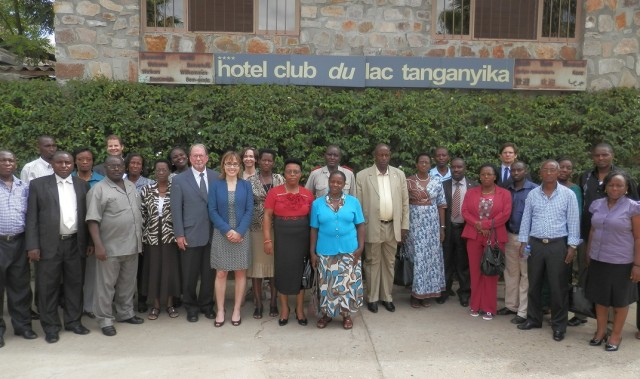[vc_row][vc_column width=”1/1″][vc_column_text]
Burundi workshop takes on electoral conflict
By Maggie Farrand
[/vc_column_text][/vc_column][/vc_row][vc_row][vc_column width=”2/3″][vc_column_text]

Thirty participants from Burundi’s Commission Nationale Electorale Independente, the Burundi National Army, the Burundi National Police and the country’s judiciary came together from May 6 to 9 in the capital city of Bujumbura as part of a four-day workshop on Conflict-Sensitive Electoral Administration.
The workshop was led by staff of Creative Associates International in conjunction with SwissPeace, a Swiss non-governmental organization, with funding from the Swiss Federal Department of Foreign Affairs (FDFA) Human Security Division.
During the workshop, participants were provided with the tools to analyze the potential for electoral conflict to occur; profile the electoral conflict dynamics; and gain techniques to prevent manage, and mediate this conflict.
The workshop’s curriculum was based on methodologies and research performed by Creative in developing the Electoral Security Framework and the Best Practices in Electoral Security handbooks for the U.S. Agency for International Development (USAID). These two handbooks provide development professionals, policymakers and practitioners with a global overview of best practices in programming related to electoral conflict and violence.
“With the completion of this workshop, the participants are able to establish a common vision of the issues surrounding conflict-sensitive electoral administration and to begin the process of planning to enhance the security of the 2015 elections,” said Jeff Fischer, Senior Electoral Advisor at Creative who conducted two days of the workshop on sessions providing methodologies on profiling electoral conflict dynamics and measures which can be taken to mitigates such threats. Fischer was the lead writer for the two USAID electoral conflict handbooks.
Presidential elections are planned for June 2015, and parliamentary elections for July. They come after nearly 12 years of conflict that killed more than 200,000 people in Burundi. While the conflict ended in 2005 and the country has seen improvements in security and governance, worries remain.
The country has implemented two multi-party elections (with President Pierre Nkurunziza as the victor), seen rebel groups transform into political parties and nurtured a vibrant civil society. But Nkurunziza’s government continues to face many political and economic challenges.
Creative’s four-day workshop in Bujumbura is the first of a series for election management bodies in various countries on preventing electoral conflict.
They are funded by the FDFA Human Security Division through a partnership with Creative. Two more are already planned for later in 2014.
“Peaceful political processes are cornerstones of any democracy. In conducting such workshops, Creative intends to build the capacity of electoral security stakeholders to assure that this important objective is realized,” says Fischer.[/vc_column_text][/vc_column][vc_column width=”1/12″][/vc_column][vc_column width=”1/4″][vc_widget_sidebar sidebar_id=”sidebar-primary”][/vc_column][/vc_row]